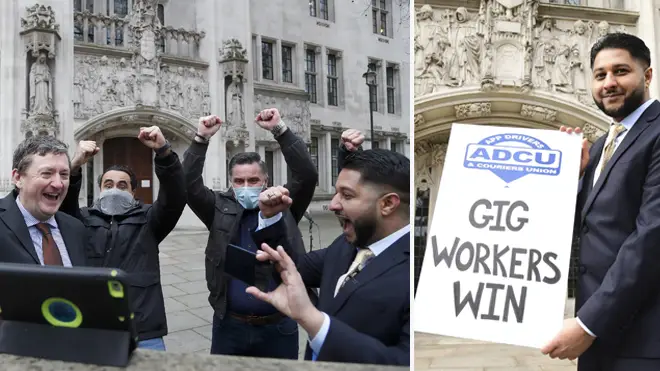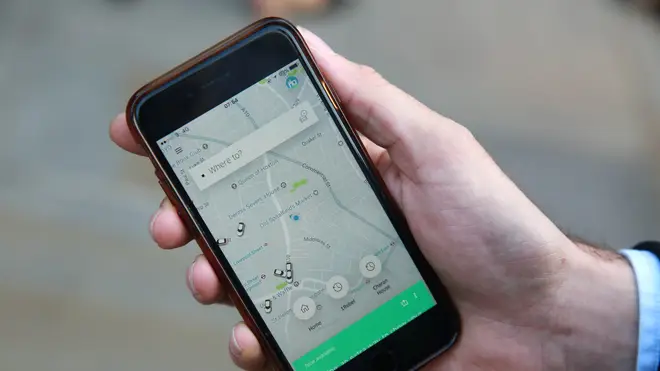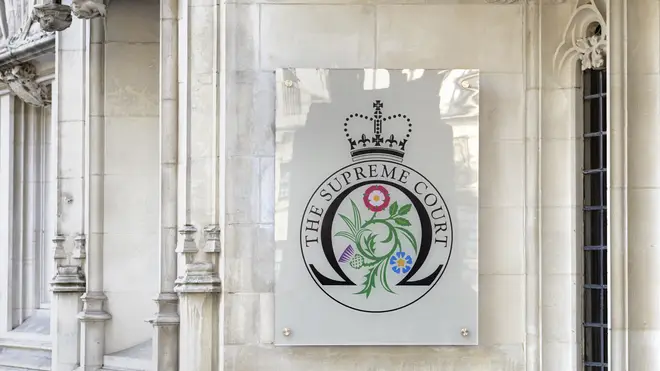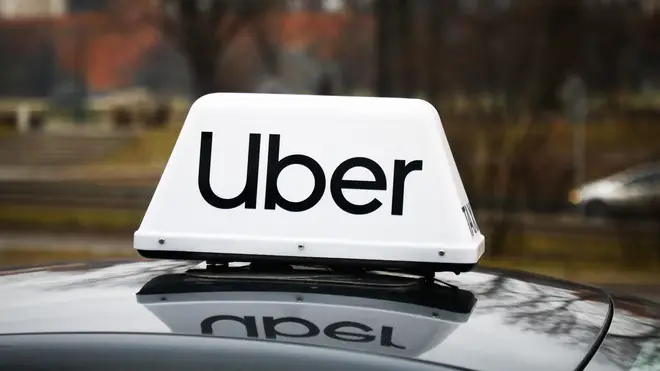
Ian Payne 4am - 7am
19 February 2021, 09:55 | Updated: 19 February 2021, 11:53

Supreme Court justices have ruled against Uber operating companies and concluded that drivers should be classed as workers, not independent third-party contractors.
Seven justices delivered a ruling on the latest round of a long-running fight between Uber operating companies and drivers on Friday.
Lawyers said the ruling means that drivers will be entitled to basic rights, such as paid holidays, and will have implications for others working in the gig economy.

Uber claimant celebrates Supreme Court ruling
Uber operating companies had appealed to the Supreme Court after losing three earlier rounds of the fight.
Uber operating companies, who said drivers were contractors not workers, appealed to the Supreme Court after losing three earlier rounds of the fight.
Justices dismissed Uber's appeal in a decision the GMB union said was "historic".
Lawyers said the ruling will have implications for the gig economy.

Mick Rix, GMB national officer, said: "This has been a gruelling four-year legal battle for our members - but it's ended in a historic win.
"The Supreme Court has upheld the decision of three previous courts, backing up what GMB has said all along; Uber drivers are workers and entitled to breaks, holiday pay and minimum wage.
"Uber must now stop wasting time and money pursuing lost legal causes and do what's right by the drivers who prop up its empire.
"GMB will now consult with our Uber driver members over their forthcoming compensation claim."
Statement from Uber on Supreme Court ruling: pic.twitter.com/70alqMrbls
— Theo Usherwood (@theousherwood) February 19, 2021
In a statement following the ruling, Uber said: "We respect the court's decision, which focussed on a small number of drivers who used the Uber app in 2016.
"Since then we have made significant changes to our business, guided by drivers every step of the way.
"This includes giving even more control over how they earn and providing new protections like free insurance in case of sickness or injury.
"We are committed to doing more and will now consult with every active driver across the UK to understand the changes they want to see."
For anyone seeking clarity about today’s Uber judgement in the Supreme Court, about what it actually means and the implications for the rest of the gig economy, this quote from employment lawyer Matt McDonald is on point. pic.twitter.com/mzy3fVS4T9
— Theo Usherwood (@theousherwood) February 19, 2021
Responding to the decision, Steve McNamara, General Secretary of the Licensed Taxi Drivers’ Association (LTDA) said: “Today’s ruling has been a long time in coming. Uber have fought with everything they have to deny their drivers the rights and protections owed to them as workers, not just in the UK, but around the world.
"We are glad that the Supreme Court has seen through their efforts and confirmed the status of their drivers as employees.
"Their insistence that drivers are independent contractors has been exposed for what it is: a smokescreen behind which they exploit hard working people.
"This exploitative behaviour has also put Londoners at risk, with exhausted drivers working excessive hours to make ends meet and running the risk of a serious accident or injury.
“Uber must now seriously consider its position in the UK. A firm that isn’t prepared to obey the law, pay its fair share of tax and protect its drivers and passengers is not a fit and proper operator."

Employment lawyer and LBC presenter Daniel Barnett explained that the ruling means Uber drivers are ‘workers’ in the eyes of the law.
He said: "A tribunal should examine the reality of the relationship between the parties, and not be bound by what the documentation states. J
"Just because Uber has made drivers sign contracts saying they're not workers, it does not mean that's true.
"The drivers are ‘workers’ from the moment they switch on their apps, and are available for work in their area, to the time when they switch their apps off at the end of the day.
Talking about the implications of the ruling, Daniel said: "Uber drivers are now entitled to claim minimum wage, including backpay for minimum wage.
"Their minimum wage claims are based upon their entire working day, not just when they had a rider in their cabs.
"It is difficult to see how the Uber business model can survive this, unless there is a very significant hike in Uber ride fees for passengers.
He continued: "Drivers can also claim 5.6 weeks’ paid annual leave each year, and will have whistleblowing and similar rights.
"However, this judgment does not give them ‘employee’ rights, such as the right to a redundancy payment or to claim unfair dismissal."

Uber claimant celebrates Supreme Court ruling
An employment tribunal ruled in 2016 that Uber drivers were workers, and were entitled to workers' rights.
That ruling was upheld by an employment appeal tribunal, and by Court of Appeal judges.
Lawyers representing Uber operating companies told Supreme Court justices that the employment tribunal ruling was wrong.
They said drivers did not "undertake to work" for Uber but were "independent, third party contractors".
But lawyers representing drivers said the tribunal was entitled to conclude that drivers were working.
A law firm enlisted by the GMB union to represent Uber drivers says they will now be entitled to compensation for lost pay.
Leigh Day lawyers think tens of thousands of Uber drivers could be entitled to an average of £12,000 each.

Mark Cairns, an Uber driver in London for five years, said in a statement: "It's been a long time coming but I'm delighted that we've finally got the victory we deserve.
"Being an Uber driver can be stressful. They can ban you from driving for them at the drop of a hat and there's no appeal process.
"At the very least, we should have the same rights as any other workers and I'm very glad I'm part of the claim."
A lead claimant in the Uber case has said the Supreme Court's ruling will "re-order" the gig economy and urged the Government to strengthen employment protections for those who work in it.
James Farrar said: "This ruling will fundamentally re-order the gig economy and bring an end to rife exploitation of workers by means of algorithmic and contract trickery. Uber drivers are cruelly sold a false dream of endless flexibility and entrepreneurial freedom.
"The reality has been illegally low pay, dangerously long hours and intense digital surveillance. I am delighted that workers at last have some remedy as a result of this ruling, but the Government must urgently strengthen the law so that gig workers may also have access to sick pay and protection from unfair dismissal."
A Leigh Day spokeswoman said the case would return to an employment tribunal, for decisions to be made on how much compensation drivers should get.